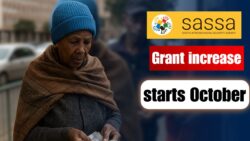In a major relief for millions of citizens, the South African government has announced a significant increase in social grants and teacher salaries for 2025. This move aims to ease the financial burden of rising living costs while rewarding educators for their continued dedication. The social grant boost is expected to uplift low-income families, while the teacher salary increment will ensure fair compensation across provinces. The new adjustments are part of the government’s broader plan to strengthen public welfare programs and education quality nationwide.

South African Social Grants Increase 2025
The South African Social Security Agency (SASSA) has confirmed that all major grants, including the Old Age Pension, Child Support Grant, and Disability Grant, will see a notable hike starting from April 2025. The increase is designed to help beneficiaries manage rising household expenses and maintain essential needs like food, electricity, and healthcare. On average, grant recipients could see an increment of R100 to R250 depending on the grant category. This adjustment reinforces the government’s continued effort to fight economic inequality and improve the living standards of vulnerable citizens.
 SASSA SRD Grant Ending In 2025: Full Details On What’s Coming Next
SASSA SRD Grant Ending In 2025: Full Details On What’s Coming Next
Teacher Salary Hike Across South Africa
The Department of Basic Education has also announced a teacher salary increase effective mid-2025. Teachers in both urban and rural areas will benefit from an average 7–9% rise in pay, depending on their experience level and grade. The new structure rewards senior educators while introducing improved allowances for those working in under-resourced regions. This move not only ensures fair compensation but also strengthens morale within the education sector, encouraging better performance and retention rates. It’s a clear indication of the government’s recognition of the vital role teachers play in shaping South Africa’s youth.

Combined Impact on Economy and Households
The combined effect of social grant adjustments and teacher pay increases will circulate more income through local economies, especially in rural and township communities. This can lead to stronger small businesses and improved household purchasing power. Economists believe that increasing disposable income at the grassroots level contributes positively to national growth. Moreover, supporting education and welfare simultaneously builds a stronger social foundation for future generations. These initiatives demonstrate South Africa’s commitment to promoting inclusivity, equality, and economic recovery after years of post-pandemic strain.
| Category | Previous Amount | New Amount (2025) | Increase |
|---|---|---|---|
| Old Age Grant | R2,180 | R2,315 | R135 |
| Child Support Grant | R530 | R620 | R90 |
| Disability Grant | R2,080 | R2,250 | R170 |
| Teacher Basic Pay (Average) | R22,000 | R24,000 | R2,000 |
Government’s Focus on Welfare and Education
By increasing teacher salaries and social grant payments simultaneously, the South African government is sending a strong message of commitment to social equity. The policy is expected to strengthen the bond between communities, teachers, and government institutions. Improved financial stability among educators will likely enhance education quality, while the grant hike helps families send children to school more consistently. This dual-boost strategy ultimately aims to create a more resilient society and sustain progress toward a balanced and inclusive economy.
FAQ 1: When will the new grant rates take effect?
The new grant rates will be effective from April 2025.
FAQ 2: How much increase will teachers receive?
Teachers will get a 7–9% salary increase depending on their grade and experience.
FAQ 3: Will disability and child grants also rise?
Yes, both disability and child support grants will increase in 2025.
FAQ 4: What’s the main goal of this policy?
The main aim is to support low-income families and strengthen education nationwide.




